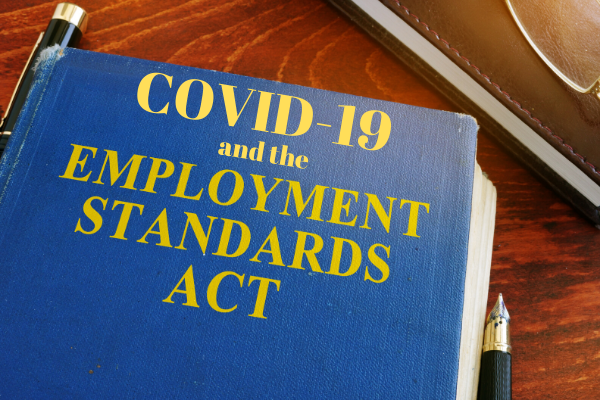#301-2706 30th Avenue
Vernon, B.C. Canada V1T 2B6
Hours: 8:00 am to 4:30 pm
Monday to Friday
Wheelchair Accessible
Telephone: 250-542-5353
Toll-Free: 1-800-243-5353
Fax: 250-542-7273

Under general principals of contract law, a party has a defense against performing under a contract where that performance becomes impossible due to unforeseeable events outside of the parties’ control. If disaster strikes, a non-performing party can resort to a claim of “force majeure”, sometimes called “acts of God”, to forgive them from living up to their responsibilities.
A pandemic can be one of those events. Some commonly listed force majeure events include natural disasters such as floods, earthquakes, or hurricanes; war; terrorist acts; government action such as expropriations or changes in laws; union activities such as strikes and slow-downs; shortages of necessary materials… and, if the contract provides for them, also epidemics and quarantines.
General economic conditions are not force majeure events. Governmental restrictions may qualify, if directly related to the force majeure event, and if they directly relate to the alleged breach of contract, but reduced demand and business are usually found to be more a fact of life than an act of God:
While relatively few cases have interpreted the impact of pandemic on force majeure clauses, previous cases do offer some guidance. Courts have found that generalized economic hardship or increase in expenses, without more, does not constitute a force majeure event. As a result, it will be difficult to avoid an obligation to purchase goods or services merely because customer demand has decreased. Also, even if an unforeseeable and extreme disaster occurs, a contract’s force majeure provision will still control with regard to the parties obligations and may override other common law defenses used to avoid performance. For this reason, it is imperative that companies read contracts closely, or consider engaging counsel, to determine what rights they have before acting (or not acting) on a contract. Finally, courts are split as to whether intervening governmental acts (such as changes of regulations, emergency declarations, etc.) will excuse performance under contract, but the contract itself will still likely control as to which party bears the risk of the nonperformance.
National Law Review: COVID-19: Force Majere Event? March 19, 2020
If a contract’s force majeure clause includes terms such as “epidemic” or “quarantine” or “pandemic”, then the clause can be invoked during the current Covid-19 crisis to avoid living up to contractual responsibilities that have been rendered impossible. Even if a contract has a force majeure clause that does not include such terms, it may still be possible to defend against an action for breach relying on the force majeure clause, if the language of the clause is broad enough to encapsulate disasters such as pandemics.
However, in any case where such a clause is invoked, in order for the defense to work, the party invoking it must also show that they took steps to mitigate the damage and that full performance was truly impossible – together with any other contractual obligations that might be necessary to adhere to when invoking the clause.
If there is no force majeure clause at all, or if there is no reasonable way to bring the COVID-19 pandemic within the terms of the force majeure claus, then there still will be defenses to breach or non-performance on the commonlaw bases of impossibility or frustration of purpose.
All of these defenses are pretty strict. The general principle of contract law is that the parties to an agreement assume the risk of their own non-performance unless the contract itself says otherwise. In order to claim impossibility or frustration, the defending party has to show that the event offends, in a way that was unforeseen to the contracting parties, a foundational assumption of the agreement. For instance: if the subject matter of the contract turns out to be non-existent, then the contract will be impossible to perform. However, it is not a basic assumption of the parties that market conditions or financial situations will remain favourable to the parties.
In this case the event is a global pandemic. The problem with pandemics (well, one of the many problems with pandemics) is that they only indirectly affect businesses. A pandemic is not that kind of natural event that destroys infrastructure or physically prevents businesses from operating. Instead, it is the social and governmental response to the pandemic that has the effect of interfering with business viability. Laws that are changed to address it are laws of general application that only affect your ability to live up to your contracts.
At the end of the day: contracts are enforceable. Rent is payable. If rent is not paid, that is a breach of contract. Force majeure is a defense available to a claim for that breach. As identified above, general economic effects do not constitute a force majeure event.
Unless the contract specifically defines pandemic as a force-majeure escape hatch, it seems unlikely that it would be considered one.
However, the global nature of the coronavirus crisis lends itself to other practical considerations. Unless there are particular circumstances that are quite significantly different than those being faced by most businesses today, it may not be in anyone’s business interests to force strict compliance with contracts right now. After all, if all contracts are strictly enforced, that may have uncomfortable effects on the very parties who insist on strict enforcement:
As the COVID-19 pandemic continues to develop, businesses should take proactive steps to ensure continuity of operations sufficient to meet existing contractual obligations and evaluate whether their counterparties are doing the same. If companies expect that COVID-19 may result in their own or their counterparties’ inability to satisfy contractual obligations, they should assess the viability of either force majeure or common law principles of nonperformance excusal. This assessment may also be rendered more complicated by the fact that many companies will be on both sides of this issue, as the performing party in some cases or the receiving party in others… Businesses may wish to avail themselves of a force majeure clause or the common law principles in connection with certain contracts, but resist such a claim by their counterparties to other contracts. Companies will therefore need to be mindful of the broader implications of asserting these provisions and principles.
P.Weiss: Force Majeure under the coronavirus Pandemic: March 16, 2020
COVID-19 related contract breaches will cut in all directions. If you insist on strict compliance with others, they may insist on strict compliance with you.
Andrew Powell practices a wide range of civil litigation with a focus on business or commercial disputes, including breach of contract, lease and land use issues, corporate disputes including liquidations and shareholder issues, and realization and enforcement. Andrew also practices estate litigation, including wills variation claims.

The COVID-19 pandemic has created unprecedented circumstances for Employers and Employees. Many people have questions with respect to their rights as Employers and Employees, and, particularly for Employers, potential liabilities.
The British Columbia Employment Standards Act sets out minimum standards that employers must adhere to. COVID-19 does not change or suspend statutory rights or obligations. Failure to adhere to these standards may result in claims against Employers and even personal liability for directors and owners of companies. Being pro-active and getting good advice now can help avoid problems and encourage creative and pro-active solutions to preserve goodwill and morale in the workplace, and to make the best of a bad situation for all.
Don’t be fooled by one size fits all solutions. Each situation is different and requires careful review and planning.
Don’t get caught out. Call for assistance.

When parents separate, their children are entitled to child support. The Child Support Guidelines set out how child support is determined.
The amount of child support depends on the income of the parent who pays the support, or both parents’ incomes if they share time with the children. If income goes up, or down, normally this will result in an adjustment to child support payments.
What Happens to Child Support if the Parent Paying Child Support Loses His / Her Employment?
The COVID-19 pandemic has had a significant impact on all of our lives. Most sectors of the economy have been affected and many businesses and employees will face a significant decrease in earnings.
So, what happens if a parent is laid off or terminated from their job during the COVID-19 pandemic but has been paying child support?
All parents in British Columbia should be aware that as of March 20, 2020 the various courts in this province have suspended regular operations. Accordingly, child support disputes likely will not be heard by the courts until they resume regular operations following the COVID-19 pandemic. Thus, parents are encouraged to find a workable solution to any child support disputes during this time.
If you are paying child support and find yourself laid off or terminated from your employment, the best course of action is to immediately inform the other parent. Be open and transparent and let them know if you will be receiving any of the benefits offered by the provincial or federal government, such as employment insurance. Try to find a mutually agreeable solution so that you can still pay some support rather than stopping support altogether.
If you are paying support payments to the Family Maintenance Enforcement Program (FMEP), also inform them if your employment status changes. On March 19, 2020, FMEP posted the following update on its website in regards to the COVID-19 pandemic:
“If you are a payor, we acknowledge you may have difficulty [during the COVID-19 pandemic] paying your full amount of maintenance that is due. You are, however, still required to pay the maintenance owing under your order or agreement. If you are unable to make full payments it is very important that you contact us by signing into your web account and sending a web message …” https://www.fmep.gov.bc.ca/whats-new/
If you are concerned about paying or receiving child support payments, our experienced team of family law lawyers are available to help you assess your specific situation and provide trusted advice on how to move forward in this uncertain time.
Darren maintains a broad practice in family law including divorce, common law separation, division of assets, parenting, custody, mobility/relocation, and child and spousal support. His diverse litigation background serves him well when acting for clients in more complex family law disputes. Darren always strives to provide tailored, down-to-earth advice for his clients.
Written by Andrew Powell, Partner
In many businesses, the owners attempt to avoid employee issues altogether by just not using them. They say, “I don’t have any employees. I use contractors.” To which, as lawyers, we generally say “are you sure”? because quite often, perhaps even usually, they are wrong. Hence, one major area of surprise liability for an employer is when they wrongly identify an employee as an independent contractor.
There are many reasons that an employer might want to use independent contractors instead of employees. For one thing, the Employment Standards Act doesn’t apply to contractors, so you can be freer with work hours and overtime and holiday pay. There are also tax reasons on both the part of the employer and the worker that make a contractor-type relationship more attractive: as an employer, you are responsible for withholding taxes and remitting them, and also for making payroll deductions – but if you use only independent contractors, you can pass that responsibility on to the worker by having them simply submit an invoice and pay them like they are an independent business. The employer doesn’t have the administration headache, and the worker can get all sorts of benefits too, such as the ability to write expenses off against their “business” income.
But beware! There are enormous issues with this structure, and you have to be extremely careful.
First: the Canada Revenue Agency is very skeptical by nature. Your business will likely be subject to audit from time to time, and contractor status is an issue where the CRA likes to shine a very bright light. You can insist up and down that your worker is a contractor, but it won’t matter. If it is determined that the worker is an employee and not a contractor, then all the remittances that were not made will suddenly need to be made, and not by the employee, but by the company. The liability for this is very real, and can be quite significant.
Next: provincially, the Employment Standards Branch is also very skeptical. A contractor may well change his mind about his status, especially if his contract ends. If for some reason, whatever reason, the worker decides that they want to take advantage of some provision of the Employment Standards Act, then that worker can file a complaint with the ESB. If the ESB determines that the contractor is in fact an employee, then the Act and all its regulations will apply, and you can be subject to penalties and orders for violating hours of work or overtime or any other of a number of things, all in one sudden retroactive flash. You may also be responsible for providing back pay – to someone you thought was an independent contractor.
Third: Courts are very skeptical. If the relationship ends (and eventually, for some reason, it will) the Courts will look at a contractor status and see right through it like it was a piece of stretched plastic wrap . It is such a standard question that the Courts may not even bother going through a detailed analysis: they can just say, “dependent contractor”, and your company can be liable for employee rights, including severance or notice periods at common law.
So, at the end of the day, if you are going to have “contractors”, make sure they are actually independent contractors. There are well established indicators for spotting true independent contractors:
– Do they own their own tools?
– Do they control their own schedule?
– Can they hire or fire someone to help them do their work?
– Do they have a chance of profit or a risk of loss?
– Can they, and do they, work for other businesses?
– And, basically, if you sniff this relationship, does the worker smell like an employee or a contractor?
Look at it like an outsider and decide. If you are using a contractor status as a favour to an employee, then on behalf of your Company, think again. The administrative savings to your business are likely not worth the risk. If someone works for you, and only you, then you are better off to just call the relationship what it is: employment.
#301-2706 30th Avenue
Vernon, B.C. Canada V1T 2B6
Hours: 8:00 am to 4:30 pm
Monday to Friday
Wheelchair Accessible
Telephone: 250-542-5353
Toll-Free: 1-800-243-5353
Fax: 250-542-7273
This site uses cookies. By continuing to browse the site, you are agreeing to our use of cookies.
Accept settingsHide notification onlySettingsWe may request cookies to be set on your device. We use cookies to let us know when you visit our websites, how you interact with us, to enrich your user experience, and to customize your relationship with our website.
Click on the different category headings to find out more. You can also change some of your preferences. Note that blocking some types of cookies may impact your experience on our websites and the services we are able to offer.
These cookies are strictly necessary to provide you with services available through our website and to use some of its features.
Because these cookies are strictly necessary to deliver the website, refusing them will have impact how our site functions. You always can block or delete cookies by changing your browser settings and force blocking all cookies on this website. But this will always prompt you to accept/refuse cookies when revisiting our site.
We fully respect if you want to refuse cookies but to avoid asking you again and again kindly allow us to store a cookie for that. You are free to opt out any time or opt in for other cookies to get a better experience. If you refuse cookies we will remove all set cookies in our domain.
We provide you with a list of stored cookies on your computer in our domain so you can check what we stored. Due to security reasons we are not able to show or modify cookies from other domains. You can check these in your browser security settings.
These cookies collect information that is used either in aggregate form to help us understand how our website is being used or how effective our marketing campaigns are, or to help us customize our website and application for you in order to enhance your experience.
If you do not want that we track your visit to our site you can disable tracking in your browser here:
We also use different external services like Google Webfonts, Google Maps, and external Video providers. Since these providers may collect personal data like your IP address we allow you to block them here. Please be aware that this might heavily reduce the functionality and appearance of our site. Changes will take effect once you reload the page.
Google Webfont Settings:
Google Map Settings:
Google reCaptcha Settings:
Vimeo and Youtube video embeds:
The following cookies are also needed - You can choose if you want to allow them:
You can read about our cookies and privacy settings in detail on our Privacy Policy Page.
Privacy Policy